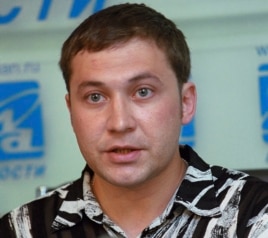
Russian-speaking Muslim Exiles Fear Possible Russia-Turkey Thaw
With a meeting between Russian President Vladimir Putin and his Turkish counterpart, Recep Tayyip Erdogan, scheduled for August, anxiety is high among one particular group of asylum-seekers in Turkey. Thousands of Russian-speaking Muslims fear a potential improvement in Turkish-Russian ties will affect them directly.
They call themselves “Muhajir” — an Arabic term for people who have been exiled from their countries of origin because of their religious beliefs and have sought to settle in states governed by sharia, or Islamic law.
While Ankara insists that Turkey is a secular nation, thousands of Russian Muslims who escaped from what human rights groups call harsh treatment by the Kremlin’s powerful security apparatus found asylum in Turkey. Russian authorities accuse many of them of extremism and even terrorism.
Those charges gained credence when an Islamic State warlord of Chechen origin was named as the mastermind of last month’s terrorist attack on Istanbul’s Ataturk Airport. The three actual attackers were identified as citizens of Russia, Uzbekistan and Kyrgyzstan.
Two other Russian citizens were designated as global terrorists by the United States on July 13, including ex-Guantanamo detainee Airat Vakhitov, who was among those arrested in Turkey after the airport attack.
Ekaterina Sokirianskaya of the International Crisis Group (ICG) believes dozens of members of Turkey’s Russian Muslim diaspora were among those rounded up after the attack, including at least 50 with ties to Islamic State, serving as recruiters, facilitators, couriers and fundraisers for the terrorist group inside Turkey.
But, she said, Russian authorities are wrong to have painted the majority of Russian Muslims in Turkey as Islamist radicals.
“By Russian standards they might seem radicalized, but in reality most of these people simply escaped from indiscriminate harassment, a common practice toward all Salafi Muslims in Russia,” Sokirianskaya told VOA in a telephone interview from Ankara.
The ICG estimates there are around 15,000 Russian-speaking Muslims in Turkey. Members of Turkey’s Russian-speaking diaspora told VOA that Russian Muslim asylum-seekers usually settle in Istanbul’s suburbs, forming close communities where “almost everyone knows everyone.”
Many of these Russian-speaking Muhajir joined the crowds that flooded the streets to challenge the coup attempt against Erdogan earlier this month. Members of the diaspora told VOA the Muhajir acted “without hesitation,” motivated by fear that the plotters, had they succeeded, would have been less likely to protect them than the Erdogan government.
But that could change if Turkey and Russia close ranks on security cooperation, said Salman Sever, press secretary of the newly formed Association of Russian-Speaking Muhajir, in a Skype interview.
Russia’s security services have already been linked to high-profile assassinations of several Chechen ex-militants in Turkey. Russia also provides Turkish authorities with lists of suspected terrorists and extremists, who then face detention in special “extradition camps” in Turkey. No one has actually been sent back to Russia, according to public records, but members of the Russian-speaking diaspora in Turkey fear that could change.
Extradition to Russia is “the worst thing that could happen to a Muhajir,” said Sever, who himself was charged with extremism in Russia for writing sympathetic posts on social media about a militant group in the Primorsky region of Russia’s Far East.
Sever left Turkey when authorities began arresting people in connection with the Ataturk airport attack. He told VOA that the people in his circle are working to unite Russian-speaking Muslims from all ethnic groups and all branches of Islam, in opposition to the Islamic State group and in favor of promoting the idea of a peaceful Islam.
“We are united in understanding that IS is Islam’s worst enemy, and the caliphate they announced is a pseudo-state,” Sever said, adding that the terrorist group has “put a target on some of our members” for publicly taking a stand against its ideology.
The group that Sever represents runs several web and social media projects, including the educational Golos Islama (Voice of Islam) website and a Facebook group that provides legal advice and information for members of the Russian-speaking Muslim diaspora in Turkey who end up on the Russian extremist lists and, consequently, in Turkish detention centers awaiting a decision on extradition to Russia.
The group includes people who are well-respected among Muslims both in Russia and in the diaspora, and who have credibility and influence, Sokirianskaya said. Still, she remains doubtful that Sever’s group will be able unite all of Turkey’s Russian-speaking Muslims around a single platform, given the deep divisions that exist based on ethnicity and one’s particular branch of Islam.
Anything less than a united platform is a dead end, argued Magomed Tuaev, a reporter in Turkey for the Russian independent news agency Caucasian Knot, who spoke to VOA via Telegram.
“There are only two options for the Russian-speaking Muslim diaspora — either integration, or further radicalization and alienation,” he said. “The only condition for such a platform for dialogue is an absolute rejection of violence.”


